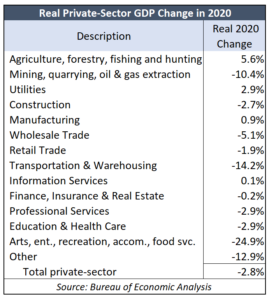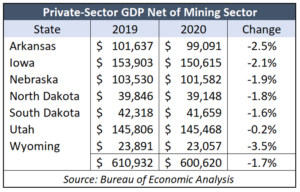Private-sector real GDP dropped 2.8% last year to $137.1 billion, more than wiping out a 1.2% gain in 2019. Private-sector GDP, which is a  measure of all finished goods and services, would have been $5.7 billion higher had it grown at the 2019 rate.
measure of all finished goods and services, would have been $5.7 billion higher had it grown at the 2019 rate.
The data comes from the Bureau of Economic Analysis and is adjusted for inflation.
The Arts and Leisure category was hit the hardest, dropping almost 25%. Oil & Gas Extraction fell by 10.4%, Transportation & Warehousing declined 14.2%, Wholesale Trade fell more than 5%, and the Other category dropped almost 13%.
Construction was down 2.7%, Retail Trade fell by almost 2%, and Finance, Insurance and the Real Estate sector was down 0.2%.
A few sectors had real growth. Agriculture had the largest gain at 5.6% and Utilities increased by almost 3%. Two other sectors had very small gains; Manufacturing grew by 0.9% and Information Services by 0.1%.
States not locked down had better private-sector GDP performance
As threats of mask mandates and other economic restrictions are being considered in Kansas, it is important to understand that the seven states that were never locked down collectively had better economic performance than Kansas.
Like Kansas, the Mining / Oil & Gas industry has an outsized effect on the economy in North Dakota and Wyoming so  that sector is excluded from all states in the adjacent table.
that sector is excluded from all states in the adjacent table.
Net Private GDP declined by 2.7% in Kansas, but the average decline among the states that weren’t locked down was only 1.7%. Every state but Wyoming did better than Kansas.
Utah was down just 0.2%. South Dakota was 1.6% lower and Nebraska only dropped 1.9%.
Private-sector employment in Kansas may not return to pre-pandemic levels until sometime in 2023 if the pace since January of this year continues. In fact, Kansas lost 4,000 private-sector jobs in the 2nd Quarter, but there were 8,500 government jobs added. Continued government growth and more COVID restrictions would have serious negative consequences for state and local economic growth.




